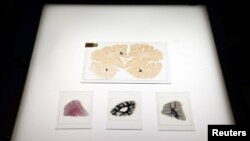Australian researchers say they have developed a new type of gel that could radically transform the treatment of Parkinson’s disease and could also help stroke patients.
The hydrogel is made from natural amino acids, the building blocks of proteins, and has been shown to safely deliver replacement cells into damaged parts of the brain.
The gel acts as a vehicle to safely transfer stem cells into the brain. Scientists believe the process can restore damaged tissue and replace lost neurons, which affect patients with Parkinson’s disease, a nervous system disorder. About 100,000 Australians are estimated to suffer from the disease, which currently has no cure.
“If you imagine a stroke, you have a whole bunch of dead cells where you are no longer getting blood flow, said professor David Nisbet, one of the lead researchers from the Australian National University’s College of Health and Medicine. “In terms of Parkinson’s disease, you lost population of neurons, that’s what results in the symptoms we are familiar with seeing. Basically, what we are doing we are introducing replacement cells into the brain to replace those ones that we can see some repair and regeneration. But they also have the added advantage that we have also shown they can actually protect some of the existing cells in the surrounding tissue once they are implanted.”
The gel is injected as a liquid. In the brain, it reverts to a jelly-like substance and can be administered to specific areas impaired by Parkinson’s or a stroke. The stem cells can then be instructed to create replacement neurons.
Nisbet said the early results are encouraging.
“These all-natural hydrogels can successfully reverse the movement symptoms related to Parkinson’s disease in animals,” he said. “But we are yet to undertake human trials, but, I mean, it is looking really promising.”
Scientists say the technology could also be used to eventually treat injured knees or shoulders.
The research is a collaboration between the Australian National University and the Florey Institute of Neuroscience and Mental Health, an Australian brain research center.
It has been published in the journal Advanced Functional Materials.











